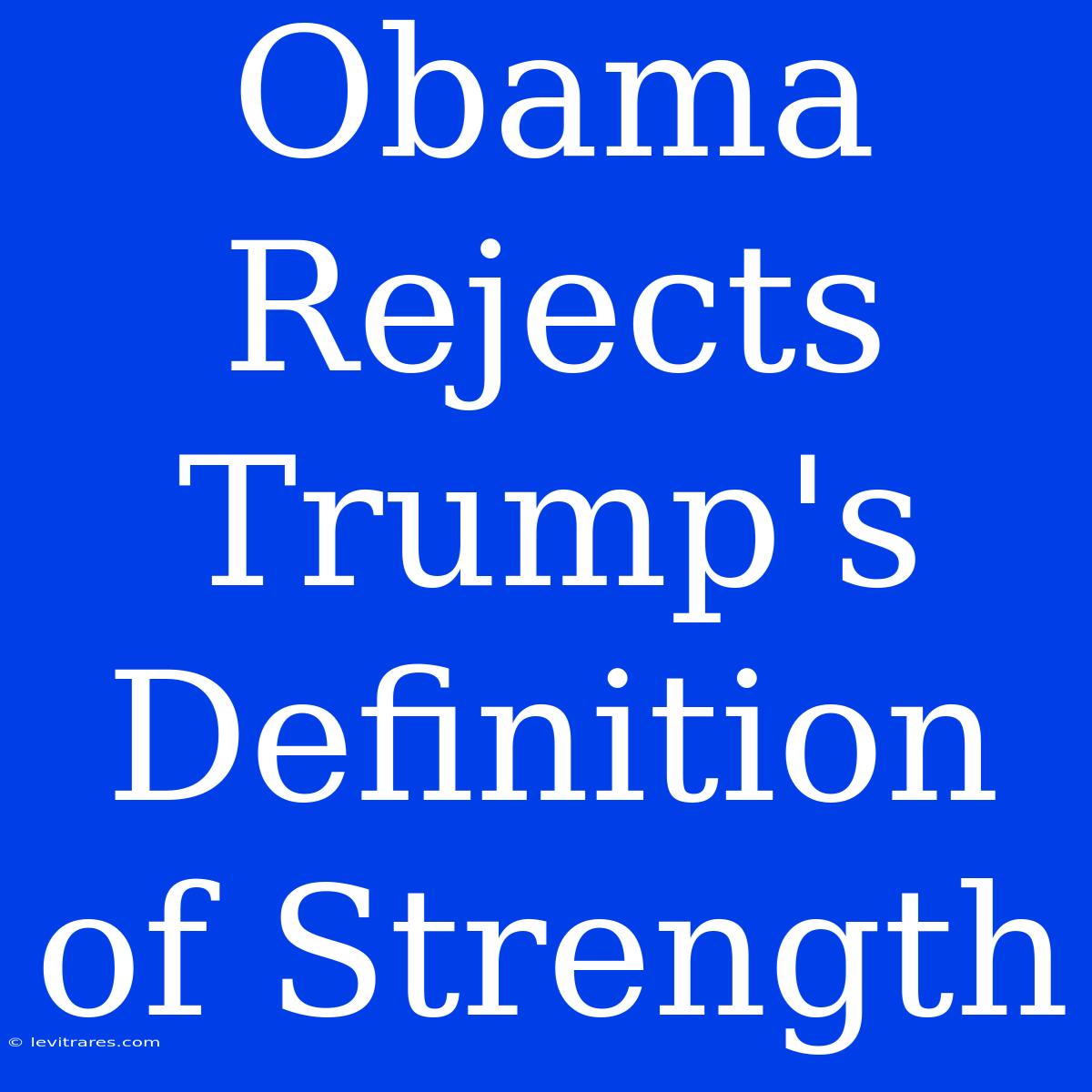Obama Rejects Trump's Definition of Strength: A Deeper Dive into Their Contrasting Worldviews
Is strength measured solely by military might and aggressive rhetoric? Or does it encompass diplomacy, empathy, and international cooperation? Barack Obama, in a pointed critique of Donald Trump's presidency, rejects the former, arguing that true strength lies in a nuanced, multilateral approach to global challenges. This article delves into the stark differences between Obama and Trump's definitions of strength, exploring their implications for U.S. foreign policy and the world at large.
Editor's Note: This analysis examines the contrasting views of Barack Obama and Donald Trump on the nature of strength in the international arena. It aims to provide a clear understanding of their respective approaches and their impact on global politics.
Why this matters: Understanding the differing views on strength held by these two prominent figures is crucial. Their contrasting definitions have real-world consequences, shaping the direction of U.S. foreign policy and influencing international relationships. This analysis examines the key tenets of their respective approaches, their successes and failures, and their lasting impact on the global landscape.
Analysis: This analysis examines the pronouncements, actions, and legacy of both presidents, drawing on scholarly articles, expert opinions, and primary sources. It analyzes Obama's emphasis on multilateralism, diplomacy, and human rights, contrasting it with Trump's focus on unilateralism, military dominance, and "America First" nationalism.
Key Takeaways:
| Obama's Definition of Strength | Trump's Definition of Strength |
|---|---|
| Multilateralism: Collaborative efforts with international partners | Unilateralism: Acting independently, prioritizing national interests |
| Diplomacy: Engaging in dialogue and negotiation | Military might: Demonstrating military strength and superiority |
| Human rights: Promoting universal values and upholding human dignity | Nationalism: Prioritizing national sovereignty and interests |
| International cooperation: Building partnerships and fostering global stability | "America First": Putting American interests above all else |
Obama's Vision: Strength Through Diplomacy and Cooperation
Multilateralism: A Shared Responsibility
- Context: Obama viewed international challenges as shared problems that required collaborative solutions.
- Facets: He emphasized working with allies and international organizations like the United Nations to address issues such as climate change, nuclear proliferation, and global health crises.
- Summary: This approach recognized the interconnectedness of the world and the need for collective action to overcome global challenges.
Diplomacy: The Power of Dialogue
- Context: Obama believed that diplomacy and negotiation were essential tools for resolving international disputes peacefully.
- Facets: He pursued diplomatic solutions to conflicts in Iran, Cuba, and North Korea, engaging in direct dialogue with adversaries and seeking common ground.
- Summary: This commitment to diplomacy demonstrated a willingness to engage in open dialogue, build trust, and seek peaceful resolutions.
Human Rights: Upholding Universal Values
- Context: Obama viewed human rights as fundamental and inseparable from American values.
- Facets: He made human rights a central focus of his foreign policy, advocating for the rights of minorities, women, and LGBTQ+ individuals.
- Summary: This commitment to human rights reflected a belief that all individuals deserve equal dignity and respect, regardless of their background or location.
Trump's Vision: Strength Through Military Power and Nationalism
Unilateralism: Putting America First
- Context: Trump prioritized American interests above all else, often withdrawing from international agreements and partnerships.
- Facets: He withdrew the United States from the Paris Agreement on climate change, the Iran nuclear deal, and the Trans-Pacific Partnership, signaling a shift towards a more isolationist approach.
- Summary: This unilateralism signaled a rejection of multilateralism and a focus on advancing national interests, even at the expense of international cooperation.
Military Might: A Show of Force
- Context: Trump saw military strength as a primary indicator of power and influence.
- Facets: He increased military spending, pursued a more aggressive military posture, and engaged in confrontational rhetoric towards adversaries.
- Summary: This focus on military might reflected a belief that demonstrating military power could deter adversaries and advance American interests.
Nationalism: Putting America First
- Context: Trump's "America First" agenda emphasized national sovereignty and prioritized American interests above all else.
- Facets: He implemented tariffs on goods from China and other countries, withdrew from international agreements, and prioritized American jobs and businesses.
- Summary: This nationalist approach signaled a desire to protect American jobs, businesses, and national interests, even if it meant withdrawing from international cooperation and partnerships.
A Comparative Look: Different Approaches, Different Impacts
- Obama's approach: His emphasis on diplomacy, multilateralism, and human rights led to significant achievements, such as the Iran nuclear deal and the normalization of relations with Cuba. However, his approach faced challenges in dealing with issues like the Syrian civil war and the rise of ISIS.
- Trump's approach: His focus on military might, unilateralism, and nationalism led to a more confrontational approach to global issues, resulting in trade wars with China and increased tensions with Iran and North Korea. His approach also resulted in a decline in America's standing on the world stage.
The Legacy: Two Visions of Strength
Obama and Trump's contrasting views on strength continue to shape global politics. Obama's approach, emphasizing diplomacy and multilateralism, highlights the importance of international cooperation and engagement. Trump's approach, prioritizing military power and national interest, suggests a more isolationist and assertive approach. The future of American leadership on the world stage will likely be shaped by the enduring legacy of these two contrasting visions of strength.

